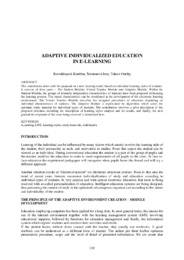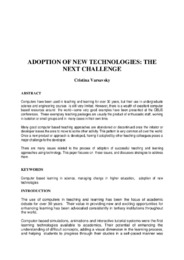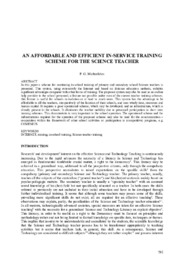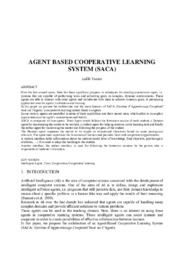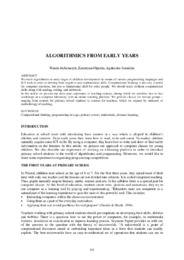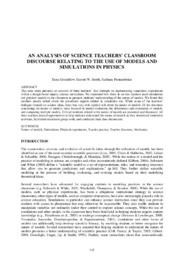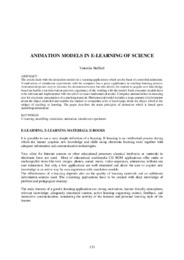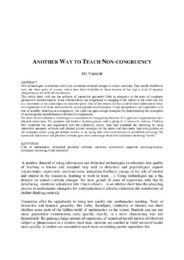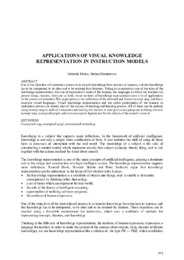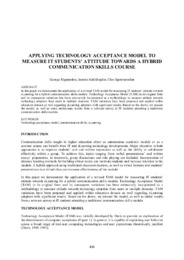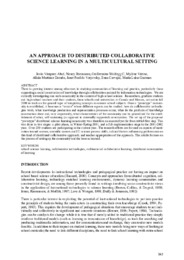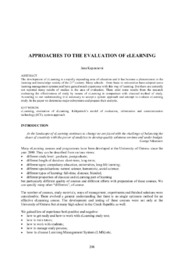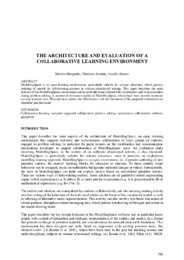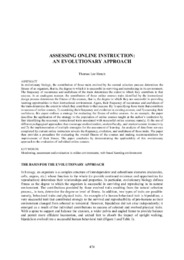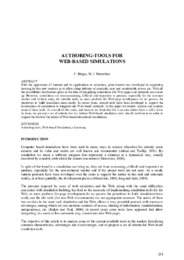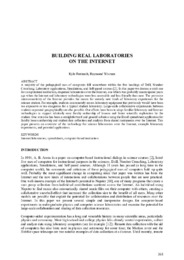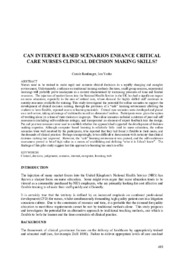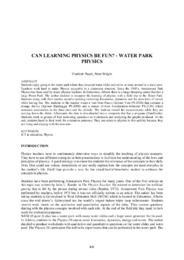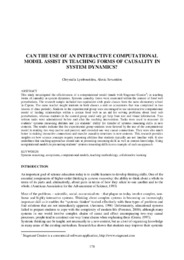Browsing Computer Based Learning in Science (CBLIS) by Title
Now showing items 1-20 of 337
-
Adaptive individualized education in e-learning
(University of Cyprus, 2010)This contribution deals with the proposal on a new learning model based on individual learning styles of students. It consists of three parts – The Student Module, Virtual Teacher Module and Adaptive Module. Within the ... -
Adoption of new technologies: the next challenge
(Pedagogical Faculty of University of Ostrava, 2001)Computers have been used in teaching and learning for over 30 years, but their use in undergraduate science and engineering courses is still very limited. However, there is a wealth of excellent computer based resources ... -
An affordable and efficient in-service training Scheme for the science teacher
(Department of Educational Sciences, University of Cyprus, 2003)In this paper a scheme for continuing in-school training of primary and secondary school Science teachers is presented. This system, using extensively the Internet and based on distance education methods, exhibits significant ... -
Agent based cooperative learning System (saca)
(Pedagogical Faculty of University of Ostrava, 2001)Over the last several years, there has been significant progress in techniques for creating autonomous agent, i.e. systems that are capable of performing tasks and achieving goals in complex, dynamic environments. These agents ... -
Algorithmics from early years
(University of Cyprus, 2010)We teach algorithmics at early stages of children development by means of various programming languages and ICT tools in order to develop their cognitive and mathematical skills. Computational thinking is not only a useful ... -
An analysis of awareness of students in the utilization of technology
(University of Zilina, 2005)With the rapid advancements in technology, people are being more tied with the technological tools and materials that meet the requirements of the society. The increase of knowledge with support from technology augments ... -
An analysis of science teachers’ classroom discourse relating to the use of models and simulations in physics
(University of Cyprus, 2010)This case study provides an account of three teachers’ first attempts in implementing simulation experiments within a design-based inquiry science curriculum. We examined how three in-service teachers used simulations and ... -
Animation Models In E-Learning Of Science
(University of Zilina, 2005)The article deals with the simulation models in e-learning applications which are the basis of controlled animation. Visualization of simulation experiments with the computer has a great significance in teaching-learning ... -
Another way to teach non-congruency
(Pedagogical Faculty of University of Ostrava, 2001)New technologies in education allow and sometimes demand changes in school curricula. They enable children to look into those parts of science, which have been forbidden to them because of too high a level of required imagination ... -
Applications of visual knowledge representation in instruction models
(Department of Educational Sciences, University of Cyprus, 2003)One of the objectives of instruction process is to transfer knowledge from teachers to learners, and this knowledge has to be interpreted, to be clear and to be retained from learners. Taking in consideration one of the ... -
Applying technology acceptance model to Measure it students’ attitude towards a hybrid Communication skills course
(University of Cyprus, 2007)In this paper we demonstrate the application of a revised TAM model for measuring IT students’ attitude towards eLearning for a hybrid communication skills module. Technology Acceptance Model (TAM) in its original form and ... -
An approach to distributed collaborative science learning in a multicultural setting
(Department of Educational Sciences, University of Cyprus, 2003)There is growing interest among educators in studying communities of learning and practice, particularly those supporting a social construction of knowledge through collaboration assisted by information technologies. We ... -
Approaches to the evaluation of elearning
(University of Cyprus, 2007)The development of eLearning is a rapidly expanding area of education and it has become a phenomenon in the learning and knowledge society of the 21st century. Many schools – from basic to universities have adopted ... -
The architecture and evaluation of a Collaborative learning environment
(Department of Educational Sciences, University of Cyprus, 2003)ModellingSpace is an open learning environment, particularly suitable for science education, which permits building of models by collaborating partners in various educational settings. This paper describes the main features ... -
Assessing online instruction: an evolutionary approach
(University of Cyprus, 2007)In evolutionary biology, the contribution of those traits evolved by the natural selection process determines the fitness of an organism, that is, the degree to which it is successful in surviving and reproducing in its ... -
Authoring-tools for web-based simulations
(Department of Educational Sciences, University of Cyprus, 2003)With the appearance of Internet and its applications to education, great interest was developed in supporting learning by this new medium as it offers cheap delivery of materials, easy and comfortable access, etc. With ... -
Building real laboratories on the internet
(Department of Educational Sciences, University of Cyprus, 2003)A majority of the pedagogical uses of computers fall somewhere within the five headings of Drill, Number Crunching, Laboratory applications, Simulations, and Self-paced courses [2]. In this paper we discuss a sixth use for ... -
Can internet based scenarios enhance critical Care nurses clinical decision making skills?
(Department of Educational Sciences, University of Cyprus, 2003)Nurses need to be trained to make rapid and accurate clinical decisions in a rapidly changing and complex environment. Unfortunately, a reliance on traditional training methods (lectures, small group sessions, experiential ... -
Can learning physics be fun? - Water park Physics
(University of Cyprus, 2007)Students enjoy going to the water park where they descend water slides and swim or jump around in a wave pool. Teachers work hard to make Physics enjoyable in a classroom situation. Since the 1980’s, Amusement Park Physics ... -
Can the use of an interactive computational model assist in teaching forms of causality in system dynamics?
(Department of Educational Sciences, University of Cyprus, 2003)This study investigated the effectiveness of a computational model (made with Stagecast Creator1) in teaching forms of causality in system dynamics. Systems causality forms were examined within the context of food web ...
